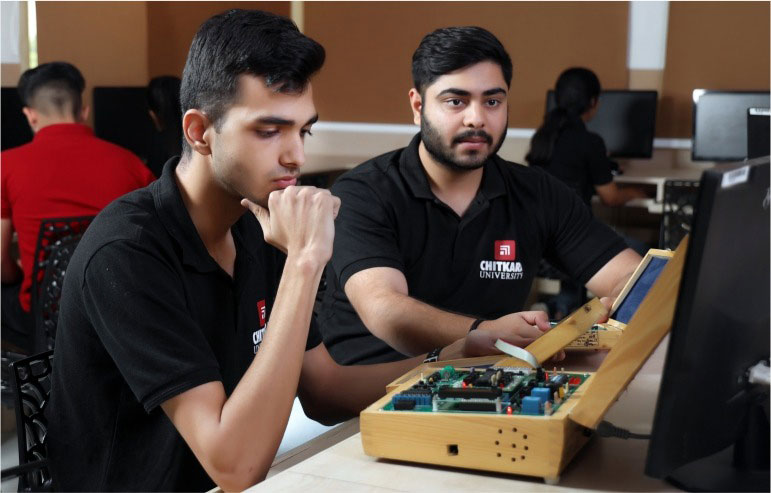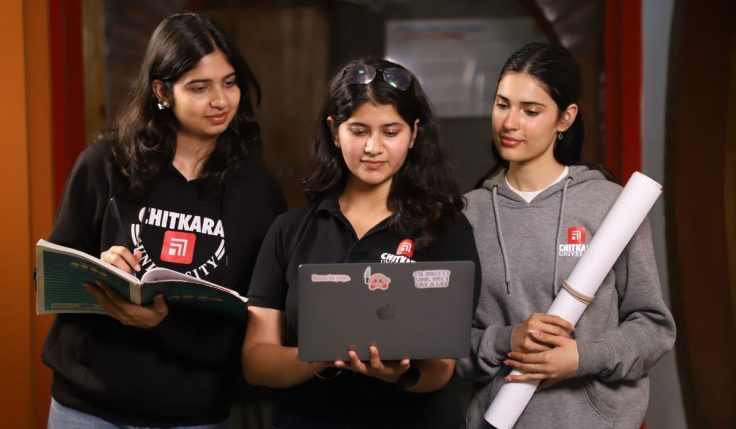The various streams of B.Tech have always been in high demand and continue to be so today. A fundamental technical academic curriculum, B. Tech aids in digesting engineering’s positive notions. Electrical Engineering is one of the most sought-after B.Tech specialities across some of the best electrical engineering colleges in India, such as Chitkara University.
Electrical Engineering is a branch of engineering that deals with the study, creation, and testing of electrical equipment or devices that support technical systems. It is a booming industry with several career prospects in various fields. Holders of an EE degree may anticipate an abundance of professional opportunities, many of which are in the finest organisations, thanks to technological improvements and the launch of new technologies.
Numerous job opportunities exist for electronics and communication engineers both in India and overseas, drawing many applicants. Furthermore, numerous businesses fall under this sector of engineering, which recently displayed enormous growth.
Also Read: What Is The Future Of B.Tech Cse In India?
Government Jobs
The graduates can also look into positions at public colleges and universities where they can engage in research or teaching. After completing this degree, a student has the option of pursuing an MBA or an M.Tech. This will boost the employment rate even more.
Some of the common government organisations that hire B.TechElectrical Engineering graduates from top engineering colleges in India are –
- All India Radio
- Indian Telephone Industries
- Civil Aviation Department
- National Physical Laboratory
- Post and Telegraph Department
- Bharat Electronics Limited
- MTNL
- National Physical Laboratories
- CRPF
- ISRO
These are some of the notable businesses and industries where job seekers might get respectable positions with greater pay. Even though communication and electronics engineers primarily do comparable tasks, their responsibilities might change depending on the classification they are given. As a result, one must be aware of the many employment alternatives, which we have discussed in the paragraphs that follow. Look at the primary duties of an electronics and communication engineer before getting down to business.
Also Read: What Are The Career Options After B.Tech In Electrical Engineering?
Roles and Responsibilities
- Electrical engineers must combine a variety of ideas and methods while creating, implementing, and maintaining the corresponding systems.
- Additionally, they must manage the equipment, develop it, and assess its effectiveness.
- To construct interfaces, engineers in this sector must draught requirements and create theoretical designs.
- Project management is a need for electronic engineers.
- Budgets for various projects must also be planned.
- Writing technical reports is another significant aspect of the profession.
- In order to identify differences and offer appropriate solutions, engineers must test and assess how systems, apparatus, devices, and gadgets function.
Specialisations
The Electrical Engineering curriculum at Chitkara University introduces potential candidates to a variety of professions. Electrical engineers are very much in demand. The greatest engineering curriculum for students to hone and apply their electrical skills is the mentioned areas of specialisations –
Electrical Engineer: An electrical engineer often concentrates on large-scale systems, such as motor control, energy transfer, power transmission, and using electricity. Electrical engineers create new electrical systems, test machinery, and resolve problems. They could work on a variety of technologies, including home appliance design, building lighting and wiring, and electrical power plants.
Telecommunication Engineer: Telecommunication engineers are responsible for analysing new network technology and making integration recommendations. They must guarantee the network’s accessibility and offer the required assistance and upkeep. They operate with a wide range of technologies, including satellite television, the internet, and optical fibre.
Telecommunication engineering is a fantastic career option for people with knowledge of databases, tables, and logging after earning a B. Tech in Electrical Engineering from a top university. For individuals with expertise developing and implementing LAN, wireless LAN, WWAN, etc., it is a suitable option.
Also Read: Masters Of Engineering In Electrical Vehicles: Future Scope
Instrumentation Engineer: An instrumentation engineer often works in sectors with automated processes with the primary objective of enhancing dependability, stability, safety, and productivity. Their primary focus is designing, developing, installing, and maintaining machinery monitoring and control devices. These engineers are in charge of fusing sensors with recorders, transmitters, controls, or displays.
Their primary responsibility is to test and maintain the system. Typically, the installation, wiring, and signal conditioning are designed or specified. For people who can translate project requirements into hardware design development and problem-solving talents, it is the finest employment option.
Micro Electrical Engineer: Microelectronics is a branch of electronics that focuses on creating tiny electrical components like microchips and semiconductors. These are all utilised in the creation of various instruments, including electrical, information technology, new biomedical, and aeronautical gadgets. Circuit boards, semiconductors, and electronic circuit chips are prototypes made by microelectronic engineers. The specialists create new designs, run tests, record the results, and then analyse the data to determine how well the new model performed.
Also Read: Future Scope Of Bachelor Of Engineering In Electrical Vehicles
Conclusion
In addition to this, an excellent option is an electrical design engineer. Alternative options include further post-graduate education. There are several alternatives for advanced degrees, including the M. Tech., MS, PhD, and MBA.
Chitkara University is a great option if you’re unsure about which institution is best for electrical engineering. It is one of India’s top universities for electrical engineering. The Institute’s accreditation by several significant MNCs, who frequently visit campus for placements, is its finest feature.






